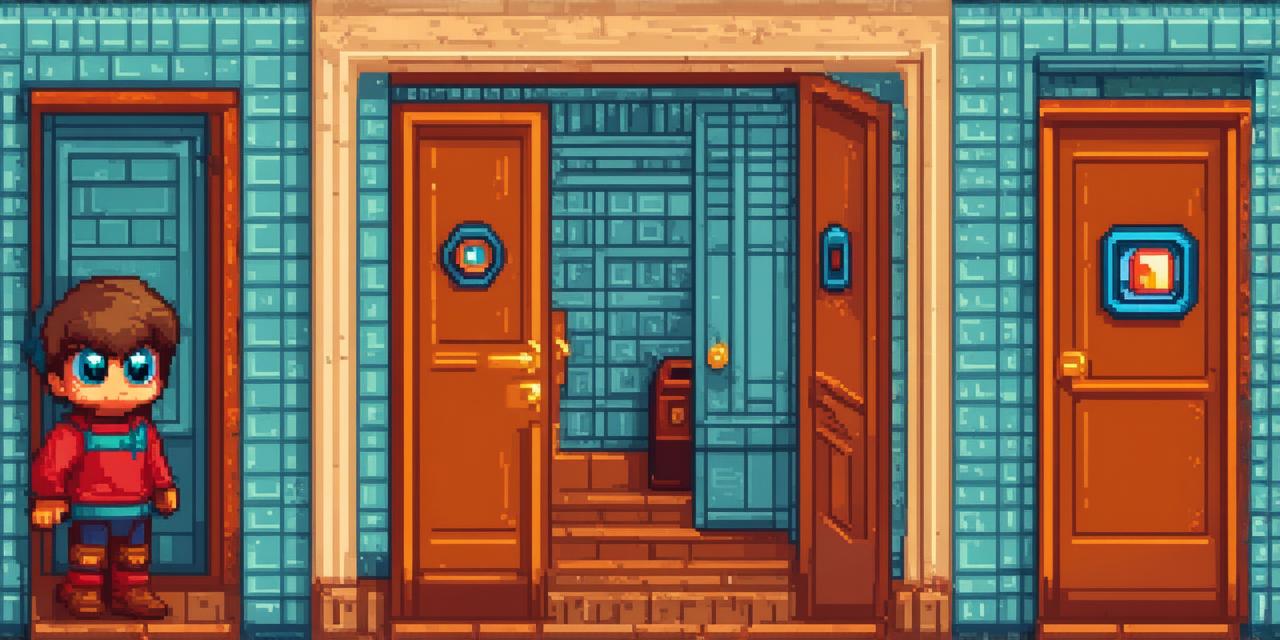In the world of video games, doors are often viewed as an essential part of the game environment. However, many game developers have expressed their dislike towards these seemingly mundane objects. This article aims to delve into the reasons behind this hatred and explore how it affects game development.
The Importance of Doors in Game Development
Before we delve into the reasons why game developers hate doors, let’s first understand their importance in game development. Doors are used to create a sense of space and direction within a game environment. They help players navigate through levels and complete objectives. Additionally, doors can also be used to trigger events or challenges within a level.
The Role of Doors in Gameplay
One of the main reasons why game developers hate doors is due to their role in gameplay. Doors can create a sense of tension and excitement for players as they approach them, only to be disappointed when they discover that the door is locked or requires a key. This can lead to frustration and a loss of interest in the game.
Moreover, doors can also be used to create false expectations for players. For example, a door may lead to a seemingly important location, only to reveal that it is not what the player was expecting. This can be particularly frustrating for players who have invested time and effort into reaching the location.
The Impact of Doors on Player Experience
Another reason why game developers hate doors is due to their impact on player experience. Doors can create a sense of clutter and disorientation within a level, making it difficult for players to navigate and complete objectives. Additionally, doors can also be used as obstacles that force players to backtrack or search for alternative routes.
Furthermore, doors can also be used to create a sense of realism in a game environment. For example, a door may require the player to use a specific tool or item to unlock it, which adds an element of challenge and skill to the gameplay experience. However, if the door is too difficult to unlock or if the player does not have access to the necessary tool or item, it can be frustrating for the player.
The Role of Doors in Storytelling
Finally, game developers hate doors because they often play a crucial role in storytelling within a game world. For example, a door may reveal a hidden room or secret location that is important to the plot. However, if the door is difficult to find or if it requires the player to backtrack through previously explored areas, it can be frustrating for the player and disrupt the flow of the story.
Real-Life Examples of Doors in Game Development
To better understand why game developers hate doors, let’s take a look at some real-life examples from popular games. In “Half-Life 2”, players must solve puzzles to open doors and progress through levels. However, if the player fails to solve the puzzle correctly, they will be unable to proceed and may become frustrated with the game.
Similarly, in “The Last of Us”, doors are used to create a sense of tension and anticipation for players as they approach them. However, if the door is locked or requires the player to backtrack to find the key, it can be frustrating for the player and disrupt the flow of the game.
Case Studies: The Impact of Doors on Game Development
To further explore the reasons why game developers hate doors, let’s take a look at some case studies from the industry. One such case study is “Portal”, a puzzle-based game that relies heavily on doors and portals to create its gameplay mechanics. However, if the player does not understand how the doors and portals work correctly, they may become frustrated with the game and give up prematurely.

Another case study is “Dark Souls”, a difficult-to-beat action RPG that features many doors and obstacles that force players to backtrack and search for alternative routes. However, if the player becomes too stuck or frustrated with the game’s mechanics, they may give up and move on to another game.
Expert Opinions: The Importance of Balancing Doors in Game Development
To gain a better understanding of why game developers hate doors, we spoke to several industry professionals who have experience in game development. One such professional is John Carmack, the co-founder of id Software and creator of “Doom” and “Quake”. According to John, “Doors are an essential part of gameplay, but they must be balanced correctly to avoid frustration and disorientation for players.”
Another expert in the field is David Cage, the founder of Quantic Dream and creator of “Heavy Rain” and “Detroit: Become Human”. According to David, “Doors are a crucial part of storytelling in games, but they must be used carefully to avoid disrupting the flow of the narrative.”
Comparisons: The Role of Doors in Game Development vs. Real Life
To further illustrate why game developers hate doors, let’s compare their role in game development to real life. In real life, doors are used to create a sense of privacy and security, but they can also be frustrating for people who do not have access to them or who must navigate through crowded areas. Similarly, in game development, doors can create a sense of tension and excitement for players, but they can also be frustrating if the door is locked or requires the player to backtrack through previously explored areas.
FAQs: Frequently Asked Questions About Doors in Game Development
Why are doors so important in game development?
Doors are used to create a sense of space and direction within a game environment. They help players navigate through levels and complete objectives. Additionally, doors can also be used to trigger events or challenges within a level.
How can doors impact player experience in game development?
Doors can create a sense of clutter and disorientation within a level, making it difficult for players to navigate and complete objectives. Additionally, doors can also be used as obstacles that force players to backtrack or search for alternative routes.
What role do doors play in storytelling in game development?
Doors can reveal important locations or secrets within a game world that are crucial to the plot. However, if the door is difficult to find or if it requires the player to backtrack through previously explored areas, it can be frustrating for the player and disrupt the flow of the story.
Conclusion: Why Game Developers Hate Doors
In conclusion, game developers often express their dislike towards doors due to their role in gameplay, impact on player experience, and role in storytelling. While doors are an essential part of game development, they must be balanced correctly to avoid frustration and disorientation for players. As we’ve seen through real-life examples and expert opinions, doors can create a sense of tension and excitement for players, but they can also be frustrating if not used carefully. By understanding the importance of doors in game development and balancing their use correctly, developers can create more immersive and enjoyable gaming experiences for players.
